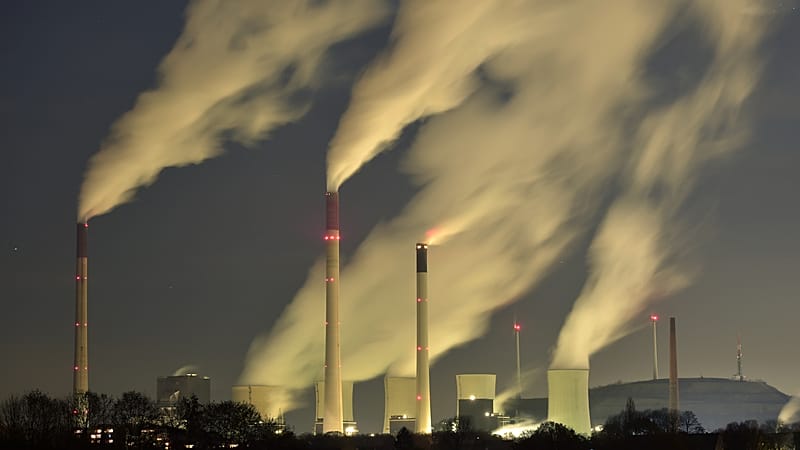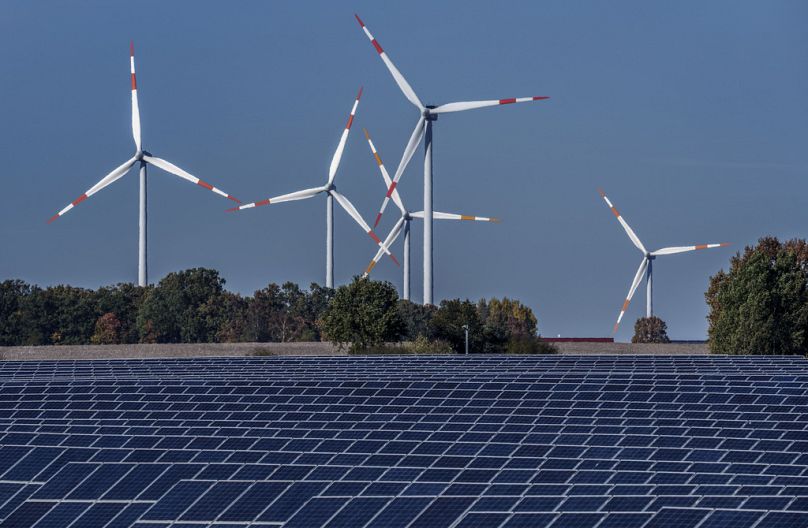EU ministers break deadlock on CO2 emission cut by 2040 amid political pressure

European environment ministers backed a watered-down revision of the EU's climate law after the inclusion of several flexibilities meant to help member states cut 90% in greenhouse gas (GHG) emissions by 2040, a compromise the Danish Presidency, which is helming the EU27 bloc, felt necessary to close the deal.
“We’ve listened and worked with all parties around the table that brought us to a very good compromise. We have agreed to a legally binding headline 2040 target of -90%, with a domestic target of 85% and up to 5% international credits. We have reaffirmed the flexibilities we have put on the table,” Climate Action European Commissioner Wopke Hoekstra told reporters.
Ministers agreed to a higher volume of polluting credits for industries to ease their path toward climate-neutrality by 2040, after a political deadlock and lengthy talks on Tuesday evening that only saw a forged deal on Wednesday morning. The impasse threatened the bloc's ability to agree on a binding climate goal, seen by many as a massive impediment to the European industry's ability to prosper.
The deal struck settled polluting credits — so-called international carbon credits — at up to 5%, up from the 3% proposed by the European Commission. However, another up to 5% could be considered as part of a revision clause if the bloc deviates from the 90% reduction path.
Finland, Germany, the Netherlands, Portugal, Slovenia, Spain, and Sweden were among the most ambitious countries seeking to maintain the 3% target on polluting credits, while France and Italy were pressing for 5% and Poland called for 10%.
Environment ministers agreed to keep the year 2036, proposed by the EU executive, as the start date for using polluting credits. However, a pilot period between 2031 and 2035 will be considered.
"The trial period is to show some parties that we are in favour of using these credits, but it can backfire. It needs to be scientifically backed," one EU diplomat told Euronews.
Carbon credits are tradable certificates that the industry can use to offset part of its emissions and create financial incentives to reduce pollution.
Each credit represents one metric tonne of CO2 reduced or sequestered from the atmosphere. Environmental groups are vocal in their opposition to carbon credits, arguing that they don't reduce pollution; they merely shift it to lower-income countries.
To agree on the 2040 climate target, more ambitious countries had to make concessions, which some considered “quite painful”, EU diplomats said, but necessary to reach a qualified majority, essential for a deal to be achieved.
Czechia, Hungary Slovakia and Poland didn't back the law's revision. Belgium and Bulgaria abstained.
The EU is revising the European Climate Law, which sets the bloc on a path to climate neutrality by 2050 relative to 1990 levels. The law requires the EU to set a 2040 climate target to bridge the gap between the 2030 and 2050 climate goals.
Several EU countries fear that efforts to reduce GHG emissions by 2040 would significantly harm the competitiveness of European industries. Stricter climate policies and tighter environmental regulations increase production costs, particularly for energy-intensive sectors like steel, they argue.
Under the bloc's climate law, the aim is to decarbonize traditional heavy industry processes through technologies like carbon capture and electrification. Clean technologies, such as heat pumps and electric vehicles, are also part of the process to decarbonise the bloc's economy gradually.
Many EU countries performing well on clean power generation or generally on track to achieve climate neutrality, are backing the 2040 climate target but others are more cautious.
At the same time, the bloc is under pressure to arrive at the UN climate summit, COP30, next week with a clear and ambitious position.
Enabling policy conditions
The international carbon credits, carbon removals and a revision clause are among the flexibilities that helped forge Wednesday's delicate deal, despite more ambitious member states voicing concerns over the bloc's credibility in the eyes of investors who need political certainty to unlock clean tech.
The latest amendments to the text seen by Euronews also included an emergency brake, proposed by France, related to CO2 emissions and removals from land-related activities. However, this measure can only be invoked after five years of the law coming into force.
With declining forest health and still underperforming carbon capture and storage technologies, the emergency brake seeks to find other ways for EU countries to offset emissions that natural carbon sinks would otherwise cover.
“We need to have realistic expectations on what CO2 removals from land and forests can contribute to (…) It needs safeguards that other sectors can’t cover shortfalls in this sector,” one EU diplomat said.
"The risk of not having a European Climate Law is bigger than having a revision clause,” one EU diplomat from an ambitious country said on Tuesday, noting the pressure to adopt a position.
After months of impasse, the most ambitious countries believe that having a revised domestic climate law is paramount for the EU to finally agree on a global climate target to present at COP30.
"If we can get a climate law with 90% we can live with a range for the 2035 climate target to present at COP30,” one EU diplomat said, referring to the statement of intent with a range between 66.25% and 72.5% that EU environment ministers agreed back in September.
Balancing climate and defence with competitiveness
Despite backing the revision of the EU's climate law, German environment minister Carsten Schneider said Wednesday's vote was a matter of self-determination and self-sufficiency for the EU, highlighting the competitiveness challenges the bloc faces.
"On the one hand, we are challenged by a great partner in the USA, who said goodbye to the international climate protection policy. On the other hand, we have to deal with China on the competitive side," Schneider told reporters.
The German minister argued that the EU needs to be at the forefront of clean technologies and innovations, noting these will benefit future markets.
"The combination of environmental protection, climate protection policy and economic policy is central," the German minister added.
Czechia's environment minister, Petr Hladík, said that the economies of central and eastern countries were struggling and insisted on technological neutrality so member states could use the most cost-efficient means to achieve the climate goals.
"We should also keep in mind that for some countries the share of industries that are difficult to decarbonise — chemistry, steel, cement, glass — is large. In these sectors, technologies are not sufficiently advanced," Hladík added.
Besides the delicate act of balancing competitiveness with climate ambition, Romania recalled the current geopolitical situation noting the "bloody war" at the EU's and Romania's borders and how much the landscape had changed since the climate law was adopted in 2021.
"[The current geopolitical situation] is demanding that citizens and companies cover the defence expenditure that has increased exponentially in a short period of time," said the Romanian environment minister Diana-Anda Buzoianu.
Lawmakers in the European Parliament will now vote on the 2040 climate target and continue negotiations with EU countries.
Today


